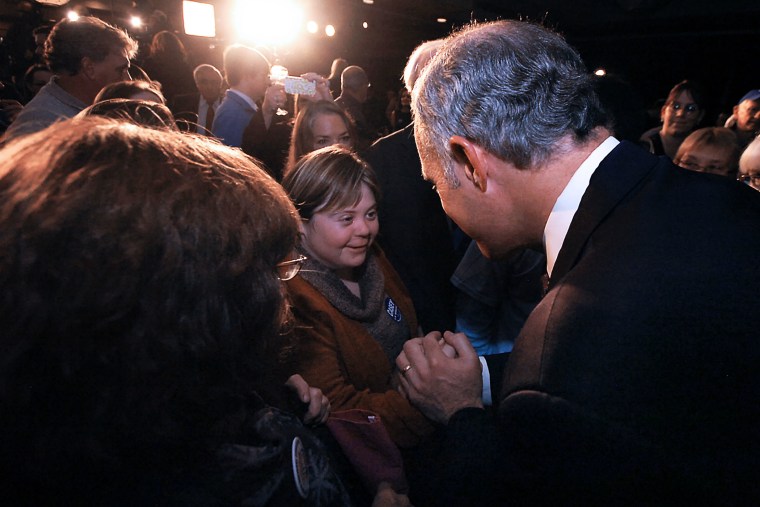Sara Wolff, 31, has never had a raise. As a law clerk working three days a week, she earns just $700 dollars a month.
"My godfather, who is actually my boss where I work, he wants to give me a raise but he can’t," she told msnbc. That's because Wolff, who has Down syndrome, can't earn more or she won't qualify for Medicaid, the government service that pays for her pricey healthcare.
Forty-year-old laws dictate that Wolff can have only $2,000 in savings and earn $700 a month -- well below the poverty level -- to qualify for the government services that often sustain those with long-term disabilities. A new bill, the ABLE Act, is trying to make it possible for Wolff and millions of others to get that raise and, most importantly, save for the future.
"It's not a magic wand, but it’s one way to give those parents some peace."'
The ABLE Act, short for the Achieving a Better Life Experience, would allow people with long-term disabilities like those on the autism spectrum or Down syndrome to save money in a tax shelter solely for important costs like housing and education, while still qualifying for Medicaid and government services.
Wolff, who plans to start working full time after the bill passes, will be able to earn more if she puts the surplus into her ABLE account.
The bill, which has its first hearing on Wednesday, would cost the country $2 billion in lost revenue and spending over a decade. But thanks in part to the advocacy of people like Wolff, the bill is expected to pass easily, with hundreds of co-sponsors from both sides of the aisle.
The bill "just makes a lot of sense," the bill's lead sponsor, Pennsylvania Democrat Sen. Bob Casey told msnbc.
“Cathy McMorris Rodgers is going to testify at our hearing, that tells you everything you need to know about the bipartisan nature of this bill,” Casey said of the Republican Conference Chairman and Washington representative.
"As the mom of a son with Down syndrome, I see firsthand how federal policies limit -- not expand – the opportunities for those with disabilities. And the ABLE Act will change that. It will make sure that Cole -- and the millions like him who have special needs -- will be able to save for their futures and reach their full potential," Rep. Rodgers told msnbc.
The bill has 74 co-sponsors in the Senate and 366 co-sponsors in the House; Sen. Casey said he expects it to pass in September.
Thanks to extreme partisanship in recent years, few bills now earn the support from both sides needed to become law. With just a quarter of a term to go, the 113th Congress has passed 44% of the number of bills passed by the previous Congress, and just 25% of the number passed by the 108th Congress a decade ago.
Even fewer earn the kind of support now behind the ABLE Act -- with everyone from advocates like the National Down Syndrome Society (NDSS) to Sens. Mitch McConnell (R-KY) and Harry Reid (D-NV) on board -- a rare feat for a bill that both cuts taxes and costs money.
“It’s a revenue measure; in this atmosphere, that makes it challenging. This is not an easy environment to get anything done,” said a Senate aide who has spent more than three years working on the ABLE Act.
She added that it was advocates' hard work that helped push the bill forward and made it a reality after so many years on the back-burner.
Sara Weir, the vice president of advocacy and affiliate relations at the NDSS, said the bill is her group's number one legislative priority and that they "put a lot of muscle from our grassroots advocacy behind this," teaching disabled people and their families to lobby their representatives.
Wolff, she added, was instrumental, too.
"Sara’s become the face of this legislation," she said. "Her story is not too different from those of other families with disabilities or non-disability, in terms of what they're planning for the future. That’s why her story has resonated with so many people."
"As the mom of a son with Down syndrome, I see firsthand how federal policies limit -- not expand – the opportunities for those with disabilities."'
The ABLE Act expands on existing educational savings vehicles, known colloquially as 529 accounts, allowing those with disabilities to establish similar accounts to pay for education, housing, transportation costs, employment training and health services not covered by Medicaid, such as dental care. Account owners can save up to $100,000 before they are ineligible for certain government services, but they'll never lose their Medicaid coverage because of an ABLE account.
"It's not a magic wand, but it’s one way to give those parents some peace," Sen. Casey said.
If the bill passes, families with a disabled child would be able to save to provide for that child.
It's a reality Wolff knows all too well: Her mother passed last year, leaving Wolff dependent on her father, whom she lives with, and her sister.
“My future is now,” Wolff said of why she feels the bill is so important. If the bill passes, she hopes to begin living independently and working full time.
After the bill's hearing on Wednesday, the House Ways and Means committee wants to “mark it up,” a Senate aide said, though the only edits the advocates expect are ones to refine the bill so it helps only those it was designed to help. After that, it’s expected to be brought to a vote in both houses of Congress sometime in September.
“You always have to assume there will be some kind of roadblock, but this one, it’s been fairly free of roadblocks,” Sen. Casey told msnbc. “This is one where there’s such support and such momentum it’s going to be very hard for anyone to hold it up.”
